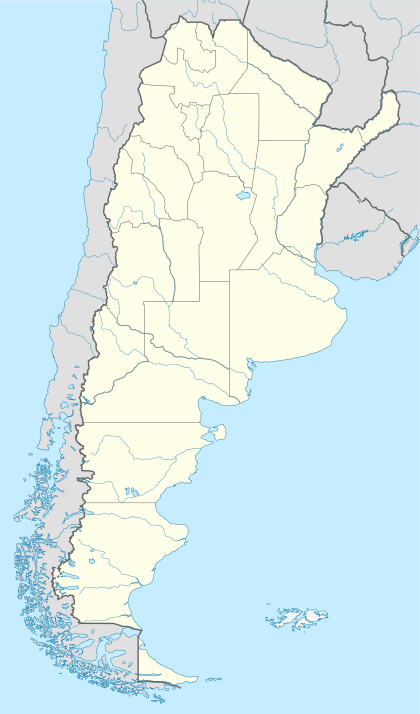General Enrique Mosconi International Airport
General Enrique Mosconi International Airport (Spanish: Aeropuerto Internacional General Enrigue Mosconi) (IATA: CRD, ICAO: SAVC) is an international airport in the Chubut Province, Argentina serving Comodoro Rivadavia. The airfield is located 8 kilometres (5 mi) north of the city, covers an area of 810 hectares (2,000 acres; 3.1 sq mi), and has a 4,000 square metres (43,000 sq ft) terminal.[1]
General Enrique Mosconi International Airport Aeropuerto de Comodoro Rivadavia "Gral. Enrique Mosconi" | |||||||||||
|---|---|---|---|---|---|---|---|---|---|---|---|
| Summary | |||||||||||
| Airport type | Public/Military | ||||||||||
| Operator | Aeropuertos Argentina 2000 | ||||||||||
| Serves | Comodoro Rivadavia, Argentina | ||||||||||
| Hub for | LADE | ||||||||||
| Elevation AMSL | 190 ft / 58 m | ||||||||||
| Coordinates | 45°47′07″S 67°27′56″W | ||||||||||
| Website | www | ||||||||||
| Map | |||||||||||
 CRD Location of the airport in Argentina | |||||||||||
| Runways | |||||||||||
| |||||||||||
| Statistics (2016) | |||||||||||
| |||||||||||
There are hills west of the runway. The Comodora Rivadavia VOR-DME (Ident: CRV) is located 4.0 nautical miles (7 km) east of the airport.[4]
The airport is the main hub of Líneas Aéreas del Estado (LADE).
History
It was built in 1929, and was officially inaugurated with an Aeroposta Argentina flight between Bahía Blanca and Comodoro Rivadavia vía San Antonio Oeste and Trelew on 1 November 1929. The new terminal was constructed in 1952. The airport was named after the Argentine military engineer Enrique Mosconi.
Aeropuertos Argentina 2000 has been operating the airport since the early 2000s.
On November 22, 2017, the longest non-stop flight ever made by the Royal Air Force (RAF) of the United Kingdom landed at the airport. The flight was part of the RAF's support in the search for the ARA San Juan (S-42) submarine which had disappeared days before. This flight also marked the first time an RAF airplane had landed at the airport since the Falklands War era.[5]
Airlines and destinations
Statistics
| Passengers | Change from previous year | Aircraft operations | Change from previous year | Cargo (metric tons) | Change from previous year | |
|---|---|---|---|---|---|---|
| 2005 | 271,777 | 8,331 | 1,128 | |||
| 2006 | 277,009 | 7,981 | 1,361 | |||
| 2007 | 289,750 | 8,621 | 1,080 | |||
| 2008 | 235,292 | 8,552 | 1,849 | |||
| 2009 | 338,473 | 9,704 | 868 | |||
| 2010 | 389,595 | 9,779 | 1,203 | |||
| Source: Airports Council International. World Airport Traffic Statistics (Years 2005-2010) | ||||||
Accidents and incidents
- 1956: An Argentine Army Douglas C-54A, tail number CTA-4, was damaged beyond economical repair at the airport, under unspecified circumstances. There were no reported fatalities.[7]
- 8 April 2004: An Argentine Air Force Twin Otter, registration T-84, force-landed 10 kilometres (6.2 mi) off the airport. Despite the aircraft sustaining substantial damage, there were no reported fatalities among the six occupants.[8]
See also


- Transport in Argentina
- List of airports in Argentina
References
- Movimiento operacional de los aeropuertos del Sistema Nacional - Año 2015- ORSNA Archived 23 January 2017 at the Wayback Machine
- Airport information for SAVC at World Aero Data. Data current as of October 2006.
- Airport Council International 2010 World Airport Traffic Report
- "Comodoro Rivadavia VOR". Our Airports. Retrieved 21 May 2019.
- http://www.telam.com.ar/notas/201711/225375-el-vuelo-directo-mas-largo-en-la-historia-de-la-aviacion-militar-britanica-para-cooperar-en-la-busqueda-del-san-juan.html
- Aerovias DAP adds Patagonia
- Accident description for CTA-4 at the Aviation Safety Network. Retrieved on 8 March 2012.
- Accident description for T-84 at the Aviation Safety Network. Retrieved on 8 March 2012.
External links
- OpenStreetMap - General Enrique Mosconi International Airport
- Aeropuertos Argentina 2000
- Accident history for General Enrique Mosconi International Airport at Aviation Safety Network
- Airport information for General Enrique Mosconi International Airport at Great Circle Mapper.